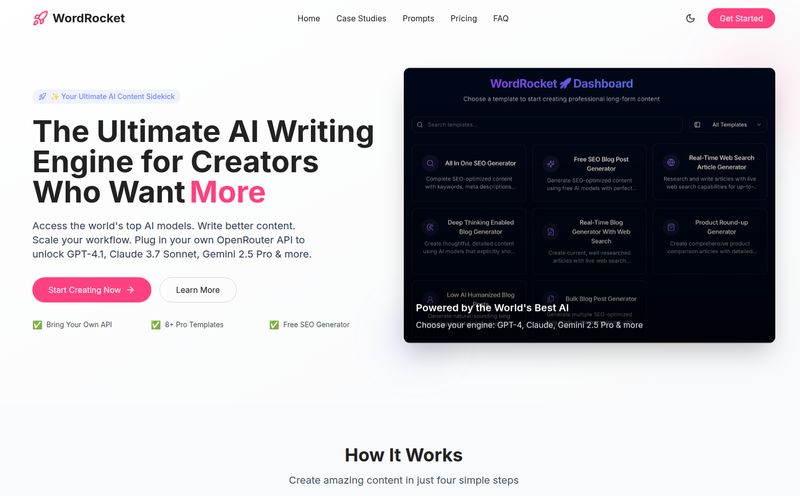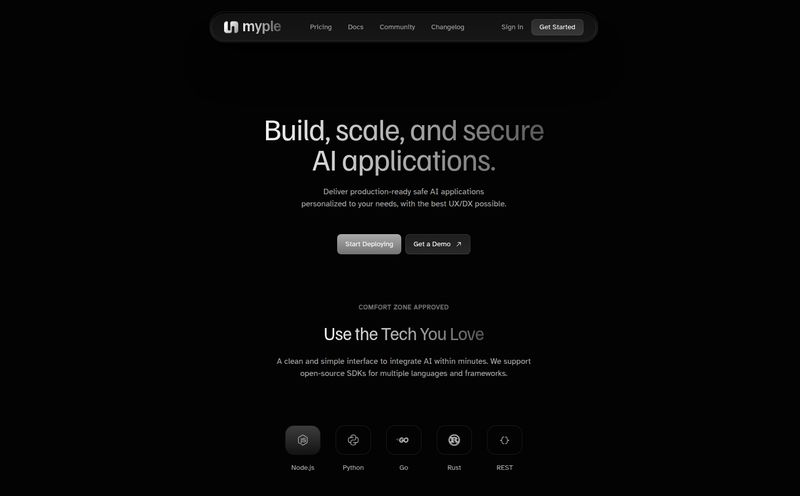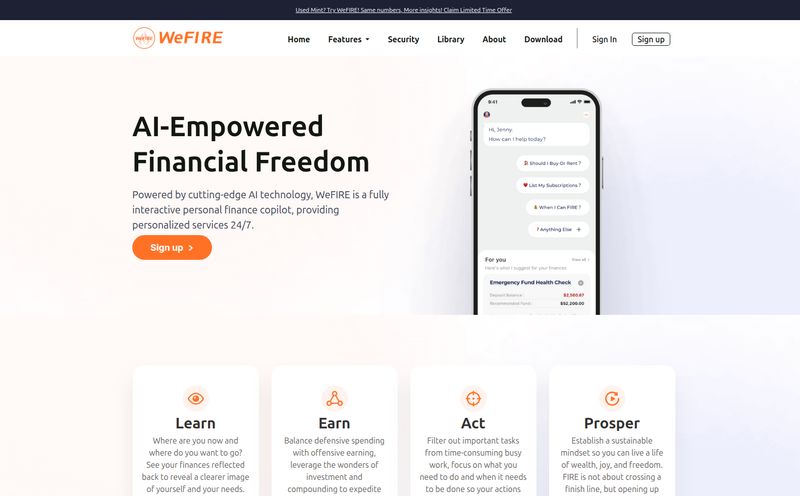I’ve been in the SEO and digital trends game for a long time. I’ve seen platforms come and go, fads fizzle out, and genuine game-changers rewrite the rules. For the past year, all anyone can talk about is AI. AI writing this, AI drawing that. And honestly? A lot of it feels a bit… trivial. Fun, but trivial.
But every now and then, I stumble upon something that makes me stop and really think. Something that isn’t just about creating a funkier social media post or summarizing a meeting. I’m talking about tools that tackle the big, hairy, audacious problems. And that’s the feeling I got when I first came across neurons.bio.
This isn’t your average chatbot. This is an autonomous, agentic AI platform aimed squarely at one of the most complex and high-stakes fields out there: life science research and drug discovery. The promise? To slash research costs and dramatically cut down the time it takes to get from a lab bench to a clinical trial. Big words. So, let's see if there's fire behind all that smoke.
So What Is Neurons.bio, Really?
Let's break it down without the corporate jargon. Imagine you're running a high-tech research lab. Instead of just hiring human researchers, you also get a team of tireless AI agents. Each agent is a specialist. One is a master librarian that has read every paper on PubMed. Another is a chemist who knows the entire PubChem database by heart. A third is a genomics expert who can map out a DNA sequence before you've finished your morning coffee.
That’s the core idea behind neurons.bio. It’s an “agentic AI” platform. The word 'agentic' is important here. It means the AI doesn’t just answer questions; it performs tasks. It uses its own tools and accesses databases to get things done. It’s the difference between asking a librarian where a book is and having them go get the book, read the relevant chapter, and give you a summary. It's a whole different level of interaction.

Visit neurons.bio
The Toolbox Behind the Breakthroughs
A platform is only as good as its features, right? From what I can gather, neurons.bio is built on a few key pillars that work together like a well-oiled machine. Or, maybe a better analogy is an orchestra, each section playing its part to create something incredible.
Your Personal AI Lab Bench: Spaces
This seems to be the main hub, your digital workbench. They call it “Spaces,” and it’s where you assemble your team of AI agents from a library of over 100 specialists. You’re not just using a monolithic AI; you’re building a custom AI toolbox for your specific research question. Need to focus on enzyme engineering? You bring in the enzyme agents. Investigating clinical trial data? There are agents for that too. This customization is, in my opinion, what separates a serious tool from a toy.
The AI Agents Doing the Heavy Lifting
The agents themselves are split into a couple of categories. First, you have the Retrieval Agents. Think of these as your data-gatherers. They are your direct line to massive, critical databases like PubMed, PubChem, and clinical trial repositories. The sheer volume of information in these databases is impossible for any human team to stay on top of. An AI agent can sift through millions of documents in seconds to find the exact connection you’re looking for. It's a powerful concept.
Then you have the Tool Agents. This is where things get really wild. These agents don’t just fetch information; they use it. The examples given—Enzyme Engineering, Relation Extraction, and Genome Browsing—are incredibly specialized. It suggests the AI can understand complex biological relationships and even navigate the blueprint of life itself. Sequencing DNA in minutes? That used to be the stuff of science fiction.
Q: The Conductor of the AI Orchestra
Overseeing all of this is “Q,” the platform’s autonomous research copilot. If the agents are the musicians, Q is the conductor. You give Q your research query, and it intelligently coordinates the right agents to work on the problem, analyze the data, and deliver real-time insights. It’s the brain of the operation, ensuring all the specialized parts are working towards a single goal: your answer.
The Real-World Impact on Research
Okay, the tech is cool. But what does it actually mean for a scientist or a biotech company? It boils down to two things that rule the industry: time and money.
The path from a hypothesis to a viable drug is brutally long and expensive. Years, sometimes decades. Millions, sometimes billions of dollars. A huge chunk of that is spent on foundational research, dead ends, and manually piecing together data from countless sources.
A platform like neurons.bio aims to take a massive bite out of that. By automating data analysis and complex tasks, it could potentially shave months or even years off the discovery phase. Failed hypotheses can be identified faster, freeing up resources for more promising avenues. For a startup biotech firm, that could be the difference between survival and bankruptcy. For a large pharmaceutical company, it could mean getting a life-saving drug to market years ahead of schedule.
Let's Be Real, No Tool Is a Magic Wand
Now, I’ve been around the block enough times to know there's no such thing as a perfect solution. Every powerful tool comes with its own set of challenges, and I'd be willing to bet neurons.bio is no exception.
First, there's gotta be a learning curve. You're not just typing into a search box. Customizing AI agents for highly specific research needs will likely require some genuine expertise. This isn't for the casual hobbyist. It's a professional instrument for professional scientists.
Second, the classic data problem: garbage in, garbage out. The AI is unbelievably powerful, but its insights are only as reliable as the underlying data from PubMed and other sources. If a study is flawed or data is incomplete, the AI might draw the wrong conclusions. It's a powerful assistant, not an omniscient god. Human oversight and critical thinking are still, and will always be, the most important ingredients.
So, What's the Price Tag on Curing Diseases Faster?
This is the million-dollar question, isn't it? As of my writing this, neurons.bio doesn’t have a public pricing page. And that’s not surprising at all.
This is not a $20/month SaaS tool. This is high-level, enterprise-grade technology for a very specialized industry. The pricing is almost certainly quote-based, tailored to the size of the research institution, the specific agents they need, and the scale of their work. While some might see that as a lack of transparency, I see it as a sign they're serious. They want to talk to you, understand your research, and build a package that fits. It's a partnership, not just a purchase.
Frequently Asked Questions About Neurons.bio
What is neurons.bio in the simplest terms?
It’s an AI platform that gives researchers a team of specialized AI “assistants.” These assistants can read scientific papers, analyze chemical data, and perform complex research tasks to speed up drug discovery.
Who should use this platform?
It’s designed for professionals in the life sciences field. Think researchers at universities, scientists at biotech startups, and R&D departments in large pharmaceutical companies.
How is this different from a general AI like ChatGPT?
While ChatGPT is a generalist, neurons.bio is a specialist. Its AI agents are pre-trained on specific scientific domains and have access to and can use tools connected to huge, verified databases like PubMed and PubChem. It's built for scientific tasks, not writing poetry.
Do I need to be a programmer to use it?
While it seems to have a user-friendly interface with its 'Q' copilot, effectively customizing agents for very unique or novel research might require a deeper understanding of the system. So, while you might not need to write code, a certain level of technical savvy is probably a big help.
Where does neurons.bio get its information?
It taps directly into major, trusted scientific databases, including PubMed (biomedical literature), PubChem (chemical substances), and various clinical trial registries. This ensures its information is grounded in the existing body of scientific knowledge.
Final Thoughts: A New Partner in the Lab
Look, the hype around AI is off the charts, and it’s easy to get cynical. But neurons.bio feels different. It feels… significant. It's applying this incredible new technology to a problem that affects every single one of us.
This isn't about replacing scientists. Not at all. It's about augmenting them. It’s about giving our brightest minds a partner that can handle the grunt work of data analysis at a scale and speed we've never seen before, freeing them up to do what humans do best: ask the right questions, think creatively, and have that world-changing eureka moment. It’s a tool that could turn the slow, methodical march of science into a full-on sprint. And I, for one, am incredibly excited to see where it goes.
Reference and Sources
- PubMed: https://pubmed.ncbi.nlm.nih.gov/
- PubChem: https://pubchem.ncbi.nlm.nih.gov/
- An overview of Agentic AI concepts: https://www.andrew-ng.com/blog/agentic-ai-workflows-are-here/



